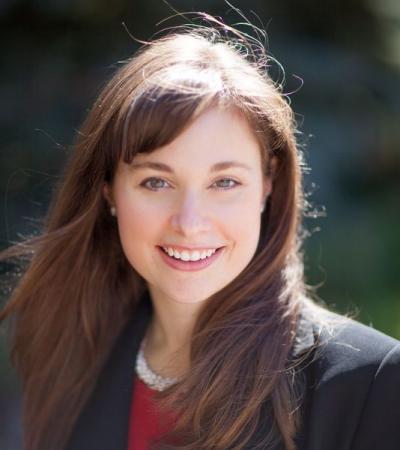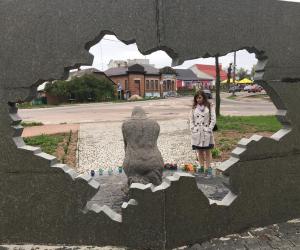This profile was current as of 2020, when she was part of the on-campus Kellogg community.
Kristina Hook is a PhD candidate in anthropology and peace studies at the University of Notre Dame. Kristina holds M.A. degrees in anthropology (2017) and in international development (2012) from the University of Notre Dame and the University of Denver’s Josef Korbel School of International Studies respectively. She also graduated summa cum laude and as a valedictorian of the University of Florida with a B.A. in anthropology. She is a Kellogg PhD Fellow.
A 2018-2019 U.S. Fulbright scholar to Ukraine, Kristina’s dissertation explores the dynamics and legacy of the Soviet-era Holodomor mass atrocities, including how these events influence modern interpretations of Ukraine’s current armed conflict. During her doctoral career, Kristina has conducted extensive fieldwork in Ukraine and is the receipt of a USAID/Notre Dame Development Fellowship. Kristina is also a fellow with the National Science Foundation’s Graduate Research Fellowship Program (NSF-GRFP).
Kristina has published on topics including genocide causality, post-conflict reconstruction, trauma healing, humanitarian lessons learned, and methods of merging theory and practice in sustainable development policies. Prior to her doctoral studies, Kristina served as a policy officer in the U.S. Department of State’s Bureau of Conflict and Stabilization Operations and as a political/economic officer in a U.S. embassy abroad. In 2013, she was awarded a U.S. Presidential Management Fellowship.
Kristina’s research interests include how genocides, mass atrocities, and mass violence unfold, as well as how qualitative and quantitative methods can be used to design more robust early warning frameworks to prevent such events. She also studies how influential stakeholders—including politicians, policymakers, academics, lawyers, and activists—respond, interact, and interpret events in the face of national crises. For her dissertation, Kristina is conducting fieldwork in Ukraine on the violence dynamics and patterns of the 1932-1933 Soviet-era Holodomor, an artificially induced famine under Joseph Stalin that claimed millions of lives. Her work also explores how the legacy of these events continue to ripple across modern Ukrainian society, including during the ongoing armed conflict in eastern Ukraine.
Kristina has previously published on topics including genocide causality, post-conflict reconstruction, trauma healing, humanitarian lessons learned, and methods of merging theory and practice in sustainable development policies. She has presented her research at more than twenty academic conferences in locations including Australia, Bosnia-Herzegovina, Canada, Czech Republic, France, Germany, Israel, Ukraine, and the United States.
Others
Journal Articles
Book Chapters
Policy Briefs
2020: Kellogg Award for Distinguished Dissertation on Democracy and Human Development
2018-2019: Fulbright U.S. student research grant to continue research on the dynamics of the Ukrainian Holodomor famine, genocide politics, and the contemporary armed conflict in Ukraine
2017-2018: USAID/Notre Dame Global Development Fellowship to support ethnographic fieldwork in Ukraine on genocidal legacies and human rights protection
2017: Society for the Anthropology of Europe Graduate Student Paper Competition Finalist for a research manuscript on political violence in Ukraine
2017: Recognized by the Society for Applied Anthropology with the Human Rights Defender Award
2017: Comprehensive (qualifying) doctoral exams unanimously awarded highest honors (“pass with distinction”) by joint anthropology and peace studies faculty panel
2016-2020: Five-year Early Career Fellowship from the National Science Foundation’s Graduate Research Fellowship Program (NSF-GRFP)
2016-2018: Selected as North American Doctoral Fellow for the Transatlantic Summer Institute for genocide-related research exchanges in Europe and North America (sponsored by the German Academic Exchange Service (DAAD), the University of Minnesota, and the University of Bayreuth (Germany)
2016-2017: National Science Foundation-funded Social Responsibilities of Researchers Program fellow for advanced ethics training in the social sciences
2016: Research grant from the Holodomor Research and Education Consortium of the Canadian Institute of Ukrainian Studies, University of Alberta









